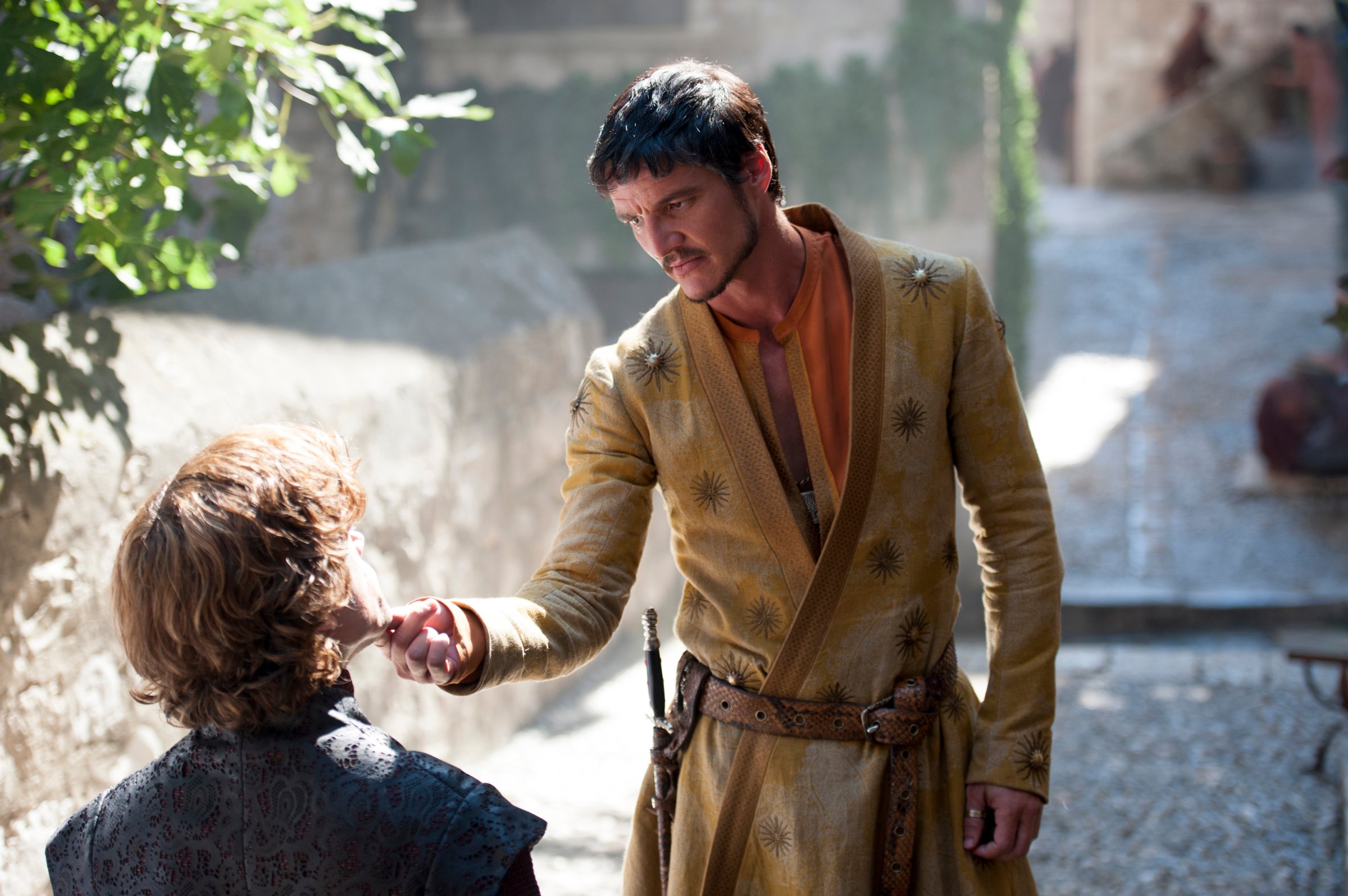
NOTE: Spoilers from Season 4 of Game of Thrones below.
Last week’s Game of Thrones spent all of its time at the Wall, and though I tried as best I could to focus on the stunning visuals of the episode, my mind was still stuck in King’s Landing. Hell, it’s still stuck in King’s Landing. All because George R.R. Martin, David Benioff and D.B. Weiss had built up Oberyn Martell as the hero that Westeros (and Tyrion Lannister) needed, only to have his head popped like a grape instead of allowing him to exact his revenge.
More so than with any previous death, even those of Ned and Robb Stark, fans were indignant: Was Martin simply being cruel? Was cruelty itself the point?
There’s no one thing that you can point to that would explain why Oberyn’s death was so affecting, so perhaps it’s best start with the most obvious one, alluded to above: he was a hero — one that that show very much seemed to need. With the most prominent members of the Stark family all murdered, Jon Snow practically a world away on the Wall and Daenerys in no particular hurry to cross the Narrow Sea, Oberyn was a rare, apparently untainted beacon of hope in the show’s most prominent location.
More than that, he had belief in himself. Oberyn very clearly saw himself as the protagonist not only of his own story but of a much larger one as well — one that involved Kings Landing and the Lannisters and revenge and justice. Ned Stark may have fought for honor, but we never quite knew why, other than that honor was what he believed in. But for most of us, we can’t really identify with some vague concept of honor, can’t root for honor — especially in a world that so clearly believes there’s no place for it.
Revenge, on the other hand, now that we can most certainly understand. Robb Stark fought for vengeance, but not at all costs and not with nearly the same magnetism that Oberyn did. We heard of Robb’s triumphs but rarely saw them, and before his murder we began to realize that he had too much of his father in him to ever exact the kind of revenge that the Game of Thrones universe demands: ruthless and entirely unadulterated.
From the moment we met Oberyn in a King’s Landing brothel, commanding the room effortlessly and declaring his hatred of the Lannisters with his tongue and his blade, it was clear he wouldn’t suffer the same difficulties that befell Robb Stark. Just as importantly, he was fun. Oberyn seemed to love (and live) life to the fullest without ever losing sight of why he came to King’s Landing in the first place. Ned Stark was never fun. Robb Stark gained confidence but never had that — for lack of a better term — swagger that Oberyn exuded whenever he appeared on screen.
In his final days, Oberyn somehow managed to both come to the rescue of the show’s most popular character while simultaneously making huge progress in his quest for vengeance. The prospect of squaring off in single combat against the Mountain — a man that struck fear in the hearts of virtually everyone in Westeros — did not scare Oberyn; it excited him. From the moment he stepped into the arena with the Mountain, Oberyn displayed the same sort of flashy confidence that had made him so enticing in earlier episodes when the only weapon he’d used was his words.
I’d have to guess that when most of us— on the rare occasion that we might do so — imagine ourselves in life-or-death combat, we don’t think of ourselves as the hulking, nearly 8-foot, 420-lb giant. We would think of ourselves as the other guy, with whatever skills that person might possess. and for Oberyn, those skills were manifold. They helped him put Westeros’ most feared warrior on his back, just one blow away from death. But the moment Oberyn looked at Ellaria and they smiled at each other, he signed his death warrant. After all, the quickest way to know something terrible is about to happen to a popular Game of Thrones character is when they’re happy.
Oberyn certainly was. He was one step closer to exacting his revenge. The Mountain was never meant to be the end — he was only one more step in Oberyn’s plan for vengeance against the Lannisters. That’s a big part of the reason his death felt like such a gut-punch. For a few moments there, we were all Oberyn Martell. There was so much more of his story — a story that seemed like a triumphant one — that was left to be told. Now it never will.
More Must-Reads from TIME
- Cybersecurity Experts Are Sounding the Alarm on DOGE
- Meet the 2025 Women of the Year
- The Harsh Truth About Disability Inclusion
- Why Do More Young Adults Have Cancer?
- Colman Domingo Leads With Radical Love
- How to Get Better at Doing Things Alone
- Michelle Zauner Stares Down the Darkness
Contact us at letters@time.com